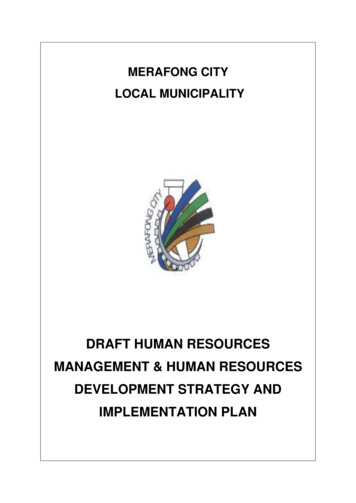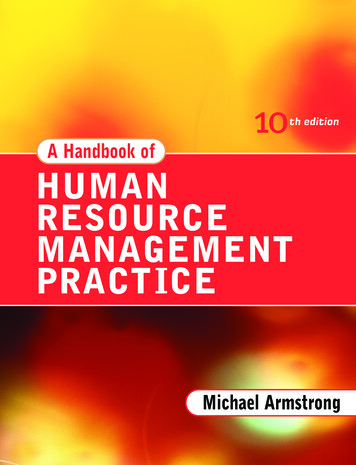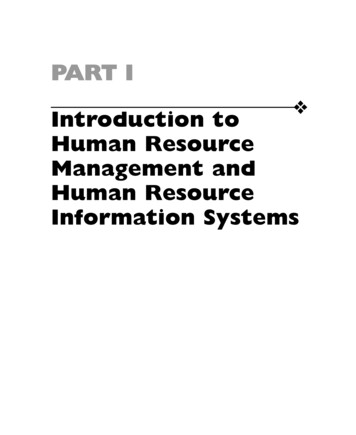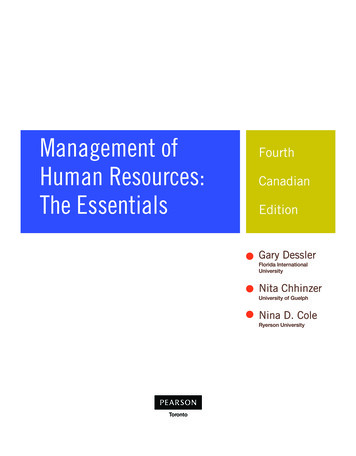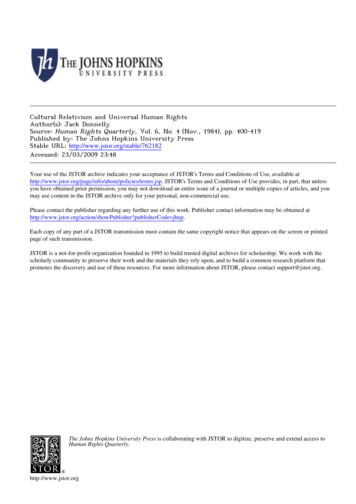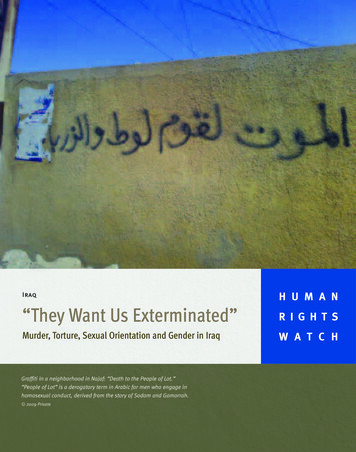
Transcription
IraqH U M A N“They Want Us Exterminated”R I G H T SMurder, Torture, Sexual Orientation and Gender in IraqW A T C HGraffiti in a neighborhood in Najaf: “Death to the People of Lot.”“People of Lot” is a derogatory term in Arabic for men who engage inhomosexual conduct, derived from the story of Sodom and Gomorrah. 2009 Private
“They Want Us Exterminated”Murder, Torture, Sexual Orientation and Gender in Iraq
Copyright 2009 Human Rights WatchAll rights reserved.Printed in the United States of AmericaISBN: 1-56432-524-5Cover design by Rafael JimenezHuman Rights Watch350 Fifth Avenue, 34th floorNew York, NY 10118-3299 USATel: 1 212 290 4700, Fax: 1 212 736 1300hrwnyc@hrw.orgPoststraße 4-510178 Berlin, GermanyTel: 49 30 2593 06-10, Fax: 49 30 2593 0629berlin@hrw.orgAvenue des Gaulois, 71040 Brussels, BelgiumTel: 32 (2) 732 2009, Fax: 32 (2) 732 0471hrwbe@hrw.org64-66 Rue de Lausanne1202 Geneva, SwitzerlandTel: 41 22 738 0481, Fax: 41 22 738 1791hrwgva@hrw.org2-12 Pentonville Road, 2nd FloorLondon N1 9HF, UKTel: 44 20 7713 1995, Fax: 44 20 7713 1800hrwuk@hrw.org27 Rue de Lisbonne75008 Paris, FranceTel: 33 (1)43 59 55 35, Fax: 33 (1) 43 59 55 22paris@hrw.org1630 Connecticut Avenue, N.W., Suite 500Washington, DC 20009 USATel: 1 202 612 4321, Fax: 1 202 612 4333hrwdc@hrw.orgWeb Site Address: http://www.hrw.org
August 20091-56432-524-5“They Want Us Exterminated”Murder, Torture, Sexual Orientation and Gender in IraqI. Introduction . 1Summary . 1Methodology, Terminology . 8II. “They Are Massacring Us”: Survivors’ Voices . 12A Spreading Campaign . 12Death Lists . 14Torture and Threats: “A Slaughterhouse on the Streets” . 20III. Extortion and the State: Nuri’s Story . 27IV. Pretext and Context: Moral Panic, Political Opportunism . 34V. Family, Gender, “Honor” .41VI. Past Attacks . 47VII. The Situation of Refugees . 53VIII. Conclusion . 58International Law . 59The Right to Life and Security. 59Protection against Torture and Inhuman and Degrading Treatment . 60Non-Discrimination and Fundamental Rights . 61Recommendations . 62Glossary of Terms . 66Acknowledgements . 67
I. IntroductionSummaryHamid, 35, developed a speech impediment from strain and grief after the murder, in April2009 in Baghdad, of his partner of ten years. We spoke to him three weeks later; he stillcould only haltingly force out words. Two friends who had helped him flee Baghdadaccompanied him. All had been in hiding through the intervening time. He said:It was late one night in early April, and they came to take my partner at hisparents’ home. Four armed men barged into the house, masked and wearingblack. They asked for him by name; they insulted him and took him in front ofhis parents. All that, I heard about later from his family.He was found in the neighborhood the day after. They had thrown his corpsein the garbage. His genitals were cut off and a piece of his throat was rippedout.Since then, I’ve been unable to speak properly. I feel as if my life is pointlessnow. I don’t have friends other than those you see; for years it has just beenmy boyfriend and myself in that little bubble, by ourselves. I have no familynow—I cannot go back to them. I have a death warrant on me. I feel the bestthing to do is just to kill myself. In Iraq, murderers and thieves are respectedmore than gay people.Their measuring rod to judge people is who they have sex with. It is not bytheir conscience, it is not by their conduct or their values, it is who they havesex with. The cheapest thing in Iraq is a human being, a human life. It ischeaper than an animal, than a pair of used-up batteries you buy on thestreet. Especially people like us.Hamid began to weep:I can’t believe I’m here talking to you because it’s all just been repressed,repressed, repressed. For years it’s been like that—if I walk down the street, Iwould feel everyone pointing at me. I feel as if I’m dying all the time. And now1Human Rights Watch August 2009
this, in the last month—I don’t understand what we did to deserve this. Theywant us exterminated. All the violence and all this hatred: the people whoare suffering from it don’t deserve it.It is enough, enough that I was able to talk to you. 1A killing campaign moved across Iraq in the early months of 2009. While the country remainsa dangerous place for many if not most of its citizens, death squads started specificallysingling out men whom they considered not “manly” enough, or whom they suspected ofhomosexual conduct. The most trivial details of appearance—the length of a man’s hair, thefit of his clothes—could determine whether he lived or died.At this writing, in July 2009, the campaign remains at its most intense in Baghdad, but it hasleft bloody tracks in other cities as well; men have been targeted, threatened or tortured inKirkuk, Najaf, Basra. Murders are committed with impunity, admonitory in intent, withcorpses dumped in garbage or hung as warnings on the street. The killers invade the privacyof homes, abducting sons or brothers, leaving their mutilated bodies in the neighborhoodthe next day. They interrogate and brutalize men to extract names of other people suspectedof homosexual conduct. They specialize in grotesque and appalling tortures: several doctorstold Human Rights Watch about men executed by injecting glue up their anuses. Theirbodies have appeared by the dozens in hospitals and morgues. How many have been killedwill likely never be known: the failure of authorities to investigate compounds the fear andshame of families to ensure that reliable figures are unattainable. A well-informed official atthe United Nations Assistance Mission for Iraq (UNAMI) told Human Rights Watch in Aprilthat the dead probably already numbered “in the hundreds.”The killings leave families terrorized and bereaved. One Iraqi magazine, in an articlesensationally promoting the need for supposed social cleansing, could not disguise orsideline the spreading grief:A 45-year-old mother said that an armed group of individuals entered herhouse in Zayouna a week ago. They kidnapped her son from his room,pointed a gun in her mouth and imprisoned her sick husband who is a retiredmilitary officer in the bathroom of the house. She never saw her son againuntil, a few days ago, she found his corpse in the morgue. Crying, the motherdescribed her son as a fashionable man who had done nothing unusual: a1Human Rights Watch interview with Hamid (not his real name), Iraq, April 24, 2009.They Want Us Exterminated2
sensitive man pursuing his studies at the college of arts. . Her son’s friendshad disappeared and she does not know anything about them, besides thelist of phone numbers her son left on a spare phone card among his personalbelongings.2Different descriptions of the campaign’s targets circulate. Most of the men whom HumanRights Watch interviewed for this report identified themselves as “gay.” However, probablyneither the murderers nor most ordinary Iraqis would recognize the term. Instead, manydescribe the victims and excuse the killings with a potpourri of words and justifications,identifying those they abominate in shifting ways—suggesting how concerns about an Iraqwhere men are no longer masculine drive the death squads, as much as fears of sexual“sin.” “Puppies,” a vilifying slang term of apparently recent vintage, implies that the menare immature as well as inhuman. Both the media and sermons in mosques warn of a waveof effeminacy among Iraqi men, and execrate the “third sex.” Panic that some people haveturned decadent or “soft” amid social change and foreign occupation seems to motivatemuch of the violence.Shadowy militias with names like Ahl al Haq (the “People of Truth”) have recently emergedinto the media to claim responsibility for some of these murders. However, most peopleHuman Rights Watch interviewed believed that the Mahdi Army, the militia led by Moqtadaal-Sadr, bears primary responsibility, and launched the killing in early 2009. Tellingly, SadrCity—a center of the Mahdi Army’s support, the giant Shi’ite slum in Baghdad named afteral-Sadr’s martyred father—has been a fulcrum of the murder campaign. Sadrist mosques andMahdi Army officials have warned vividly about the spreading dangers of the “third sex.”Springing up amid the breakdown of security after the US-led 2003 invasion (and sometimestacitly supported, sometimes combated by the occupation authorities), militias in Iraq feedon poverty and despair, recruiting young men who see violence as their only future. They areloose networks rather than disciplined entities; identifying either their members or clearaccountability for crimes committed in their names is often difficult.3 This is particularly trueof the Mahdi Army, which strategically withdrew from visibility at the beginning of the 2007US “surge,” avoiding confrontation with American forces by melting into the population.2“The War Between the ‘Puppies’ and the Kidnappers,” Al-Esbuyia, May 10-16, 2009.See Patrick Cockburn, Muqtada: Muqtada al-Sadr, the Shia Revival, and the Struggle for Iraq (New York: Simon and Schuster,2008), for a detailed account not only of al-Sadr’s career but of the Mahdi Army’s ambitions and modus operandi.33Human Rights Watch August 2009
Several people speculated to us that the Mahdi Army, striving to rebuild its reputation afterthis prolonged absence, sought to rehabilitate itself by appearing as an agent of socialcleansing. It exploited morality for opportunistic purposes; it aimed at popularity bytargeting people few in Iraq would venture to defend. One “executioner” told a reporter inMay that he and his fellow killers were tackling “a serious illness in the community that hasbeen spreading rapidly among the youth after it was brought in from the outside byAmerican soldiers. These are not the habits of Iraq or our community and we must eliminatethem.” He added—implicitly trying to counter one common complaint about the militias, thatfor years they had delivered only violence and chaos into Iraqi lives: “Our aim is not todestabilize the security situation. Our aim is to help stabilize society.”4If the killings were a bid for popularity, they may have backfired. The grieving families foundeven among the Mahdi Army’s core communities in Sadr City lent no burnish to its image. Inlate May 2009, a Sadrist spokesman gave an interview pointing to ongoing public meetingsthe militia was holding to “fight the depravity and urge the community to reject” homosexualconduct; but he added that “al-Sadr rejects” violence, and that “anyone who commitsviolence against gays will not be considered as being one of us.”5 At the same time, however,another Sadrist leader proclaimed homosexuality “a disaster that has come to thecommunity,” saying “We must correct the morals of the nation.”6 Human Rights Watch hasreceived testimonies suggesting that in some areas Sunni militias were also joining,possibly competitively, in the campaign of threats and violence.Iraqi police and security forces have done little to investigate or halt the killings. Authoritieshave announced no arrests or prosecutions; it is unlikely that any have occurred. While thegovernment has made well-publicized attempts since 2006 to purge key ministries ofofficials with militia ties, including the Ministry of Interior, many Iraqis doubt both itssincerity and its success. Most disturbingly, Human Rights Watch heard accounts of policecomplicity in abuse—ranging from harassing “effeminate” men at checkpoints, to possibleabduction and extrajudicial killing.Quoted in Nizar Latif, “Iraqi ‘Executioner’ Defends Killing of Gay Men,” The National, May 2, REIGN/705029847/100, accessed May 29, 2009. The man also claimed thathe had been a Mahdi Army member “but was now working independently after the militia was disbanded by the leader of theSadr movement, Muqtada al-Sadr.” However, al-Sadr never dissolved the militia, simply ordered it to stand down when the USsurge began. It remains a recognizable and powerful force in Sadr City and elsewhere.45Sheikh Wadea al-Atabi, quoted in “Iraq’s Sadr Wants ‘Depraved’ Homosexuality Eradicated,” AFP, May 29, ALeqM5gyEDJh2jz2X-0cesB76vl6eIJL6Q, accessed May 30, 2009.6Sheikh Dawud al-Enezi, quoted in ibid.They Want Us Exterminated4
Police certainly spread stories to the media that belittled the murder campaign’s scope, andtried to shift responsibility away from militia death squads to family and tribal violence.7“Honor”—and patriarchal and tribal values around masculinity, sexuality, and shame—indeed exacerbate prejudice and incite harm, as Human Rights Watch documents in thisreport. They do not, however, detract from the death squads’ culpability as chief actors. Nordo they diminish the state’s unfulfilled responsibility to investigate and prosecute murders,to punish those found responsible, and to protect the rights and lives of all Iraqis, withoutdiscrimination.Human Rights Watch has previously reported on insurgent violence against civilians in Iraq—as well as on the refugee crises that violence produced, with hundreds of thousands ofdisplaced Iraqis forced to flee their homes and country. This report does not contend thatmen suspected of being “gay,” or of being insufficiently “manly,” face worse violence nowthan many other Iraqis have in the past. However, the sharp spike in killings this year pointsto lethal failures that persist, despite the Iraqi government’s and coalition authorities’ selfcongratulation on their supposed pacification of society. In Iraq, armed groups still are freeto persecute and kill based on prejudice and hatred; the state still greets their depredationswith impunity. The attacks on the “third sex” and “gay” men may be only the first round in arenewal of cycles of militia bloodshed. All Iraqis should be concerned about such a revival ofkillings. It is incumbent on the Iraqi government to speak out against it, and to stop it.Many people have speculated, to Human Rights Watch or in the press, that a fatwa or rulingon religious law by Moqtada al-Sadr or another cleric had launched the campaign. A youngman in Sadr City told an Iraqi columnist that “the killing operations are not crimes since theyfall under the jurisdiction of a religious fatwa.”8Human Rights Watch was unable to find evidence that any explicit, recent fatwa exists. Infact, however, the killings violate the norms and procedural standards of shari’a law. It istrue that the Ja’fari school of Shi’ite jurisprudence, along with all four schools of Sunni law,considers homosexual conduct between men (liwat) a crime. The penalty applied to aperson convicted of liwat can be a fixed punishment (hadd), which may under certainSee, for example, Timothy Williams and Tareq Maher, “Iraq’s Newly Open Gays Face Scorn and Murder,” New York Times,April 7, 2009, /08gay.html, accessed May 2, 2009: “The chief of aSadr City police station said family members had probably committed most of the Sadr City killings. He played down therole of death squads that had once been associated with the Mahdi Army, the militia that controlled Sadr City until Americanand Iraqi forces dislodged them last spring. ‘Our investigation has found that these incidents are being committed byrelatives of the gays — not just because of the militias,’ he said. ‘They are killing them because it is a shame on the family.’”7Saeedoun Mohsen Damd, “By Saad,” Al-Rafidayn, May 11, 2009,http://www.alrafidayn.com/index.php?option com content&view article&id 7554:2009-05-11-09-3002&catid 7:opinion&Itemid 52, accessed May 15, 2009.85Human Rights Watch August 2009
circumstances extend to execution; or it can be a discretionary measure (ta‘zir), which mayrange from death down to a warning. It is crucial to stress, however, that in either case Ja’farilaw lays out conditions which must be met before a sentence can be imposed. Theselimitations are protections for privacy and reputation, and against arbitrary trials.Four conditions are relevant here. High evidentiary standards are required. Homosexual acts can only be establishedby a confession repeated four times9; by the unimpeachable testimony of four malewitnesses (bayyina); or by the judge’s personal observation of the acts (‘ilm alhakim). If an accusation of liwat turns out to be false, the accusers themselves arepunished as slanderers (qadhafa).10 The judge must determine that the defendant is an adult, is capable of rationalthought, and acted voluntarily.11 The judge must investigate whether suspicious acts (such as sharing a bed) were theresult of necessity, such as lack of space.12 The punishment must be imposed by a qualified jurist.13For execution to be imposed as a fixed punishment (hadd), three additional tests must bepassed. Penetration must be proven: the hadd cannot be imposed for non-penetrative acts.(This is called the standard of iqab.)9Al-Hurr al-‘Amili (d. 1693 CE), Wasa’il al-Shi‘a ila Tahsil Ahkam al-Shari‘a (Beirut: Mu’assat Al al-Bayt l-Ihya al-Turath, 1993),vol. 28, Abwab Hadd al-Liwat.10Ibid, traditions 33451, 34453, and 34454.Some Ja’fari jurists also restrict the death sentence in cases of liwat to individuals who are married. The dominant Ja’fariview, however, rejects this restriction. Shaykh al-Ta’ifah al-Tusi (d. 1068 CE), Tahdhib al-Ahkam fi Sharh al-Muqni‘ah li-lShaykh al-Mufid (al-Najaf: Dar al-Kutub al-Islamiyya, 1958), vol. 10, Bab al-Hudud fi-l-Liwat, traditions 194/3, 200/9, and201/10; Al-Hurr al-‘Amili , Wasa’il al-Shi‘a ila Tahsil Masa’il al-Shari‘a, vol. 28, Abwab Hadd al-Liwat.11Shaykh al-Ta’ifah al-Tusi, Tahdhib al-Ahkam vol. 10, Bab al-Hudud fi-l-Liwat, tradition 207/16; Al-Hurr al-‘Amili (d. 1693),Wasa’il al-Shi‘a ila Tahsil Masa’il al-Shari‘a, vol. 28, Abwab Hadd al-Liwat, chapter title and tradition # 34465.12Thus Ayatollah Ruhollah Khomeni, writing on the principle of “Wilayat al-Faqih” or the “government of the jurist,”emphasizes that fixed punishments (hudud) can only be applied by an established authority (either an imam or a credentialedjurist). Sunni jurists impose basically the same requirements for a conviction as Ja’fari law. However, while most Shi’itetheories of political authority—theories of who is empowered to apply the laws—take the figure of the imam as their ultimatemodel of just rule, Sunni theories treat legitimate government as derived from other models, such as “contract” or“necessity.” See, for instance, Hamid Enayat, Modern Islamic Political Thought (London: Macmillan, 1982). In addition, Sunnijurists require only two witnesses to establish proof of liwat as opposed to four in Ja‘fari law, though Sunni jurists require fourwitnesses to prove illicit heterosexual intercourse (zina).13They Want Us Exterminated6
The slightest doubt of guilt must be eliminated, according to the legal principle ofdar’ al-hadd bi-l-shubha (“fixed punishments are thwarted by doubt”). Ja‘fari juristswriting on the fixed punishment for liwat stress that the hadd cannot be appliedbased on “possibilities” (la hadd ma‘a al-ihtimal).14 Uncertainty about the goodcharacter of alleged witnesses to the act, or discrepancies in their testimonies,should preclude a sentence. The accused must be given a chance to repent, and repentance can prevent asentence of execution.15The killings arbitrarily flout these limitations. Summary executions, without trial, based onrumor and accompanied by torture, at the hands of armed gangs—all these strike at shari’astandards of evidence, legality, and justice.They also strike at the principles of human rights. International human rights law safeguardsthe right to privacy, including the right to an intimate life undisturbed by surveillance orviolence. It protects the right to free expression, including the right to express one’spersonhood through dress and behavior. It absolutely prohibits, in all circumstances, allforms of torture and inhuman treatment. It guarantees the right to life, including the right toeffective state protection.Iraq’s leaders must be defenders of all its people. The Iraqi state must desist from silence,and fully and immediately investigate the murder and torture of people targeted becausethey do not correspond to norms of “masculinity,” or are suspected of homosexual conduct.It must appropriately punish those found responsible. It must take effective steps to restrainmilitia violence consistent with its own human rights obligations. It should dismiss anypolice or criminal justice officials who are found responsible for human rights abuses or whohave been linked in the past to death squads or militia forces. It should properly vet andtrain members of the police, security forces, and criminal justice system, ensuring that14Al-Muhaqqiq al-Hilli (d. 1277 CE), Shara’i al-Islam fi Masa’il al-Halal wa-l-Haram (Beirut: Dar al-Adwa, 1403/1982), vol. 4, pp.933 and 944.Shaykh al-Ta’ifah al-Tusi, Tahdhib al-Ahkam, vol. 10, Bab al-Hudud fi-l-Liwat, tradition 198/7, tells how Amir al-Mu’mininImam Ali received a man who confessed to liwat three times. Amir al-Mu’minin finally told him after his fourth confession thathis punishment would be death. The man repented, however, leading Imam Ali to weep and set him free—telling him that hisrepentance caused the angels to weep as well.15Meanwhile, the Hanafi school of Sunni jurisprudence adds another limitation: applying death as a hadd for anal intercoursebetween men is restricted to cases when liwat has become an ‘ada or habit, as opposed to acts that occur only once. Ibn‘Abidin (d. 1836 CE), Radd al-Muhtar ‘ala al-Durr al-Mukhtar (Beirut: Dar Ihya’ al-Turath al-‘Arabi, 1987), vol. 3, pp. 155-6.7Human Rights Watch August 2009
trainings in human rights include issues of sexual orientation and gender. Over the longerterm, the Iraqi government should establish and safeguard the rule of law, to ensure that noIraqi need fear extralegal punishment by armed men enforcing their own prejudice andhatred.The US and the US-led multinational forces in Iraq should assist the Iraqi governmentwherever possible in investigating these crimes. They should also end arbitrary detentionwithout trial, including the arbitrary detention of suspected militia members, and provideappropriate services to released detainees to assist them to rejoin society, and ensure thatthey do not resume violence. 16Finally, as many Iraqis targeted in the killing campaign are forced to flee the country, theinternational community must recognize that they are under threat not only at home, but inthe surrounding countries where they seek first refuge. As this report documents, nearly allthose countries criminalize consensual homosexual conduct; all have social environmentsof severe prejudice. The United Nations High Commission on Refugees and the internationalcommunity should prioritize prompt, and where necessary accelerated, resettlement in safethird countries for those endangered people.Methodology, TerminologyThis report is based primarily on research conducted in Iraq from April 14-28, 2009 by RashaMoumneh, researcher in the Middle East/North Africa division of Human Rights Watch, andScott Long, director of the Lesbian, Gay, Bisexual, and Transgender Rights program atHuman Rights Watch. During that visit, we interviewed 22 Iraqi men face-to-face; they told usstories of death threats, abductions, attempted assassinations and other forms ofpersecution. We communicated with and interviewed 24 other men in Iraq by telephone, email, or internet chat. In July 2009, Scott Long interviewed an additional eight Iraqi men inLebanon. All the men we spoke to requested that we not use their real names. We haveconcealed the locations in Iraq (and, in some cases, outside Iraq) where interviews tookplace, to protect the safety of these and others. Human Rights Watch also spoke to Iraqihuman rights activists, journalists, and medical doctors in the course of its research.16The United States and the US-led coalition in Iraq have, in recent months, rapidly cycled out of detention people arbitrarilyarrested during the surge, while apparently providing only nugatory support or services to prevent a return to violence. At theheight of the surge, the US held over 26,000 prisoners in Camp Bucca, a detention camp near the Kuwaiti border; by March2009, this number had reportedly fallen to under 10,000. See Anthony Shadid, “In Iraq, Chaos Feared as U.S. Closes Prison,”Washington Post, March 22, 2009. The practice of arbitrary detention undermines efforts to build the rule of law in Iraq. Ifneither coalition authorities nor the Iraqi government accept any substantive responsibilities to assist detainees’reintegration upon their release, it also risks feeding the resurgence of militia violence.They Want Us Exterminated8
All the survivors of militia violence Human Rights Watch interviewed for this report identifiedthemselves as “gay.” Some reflection on terminology and identity is necessary here. The useof “gay” in English to describe men who have emotional or sexual relationships with othermen is relatively recent, emerging out of a North American subculture in the twentiethcentury. (“Homosexual” does not much predate it in European languages; the term wascoined by an Austro-Hungarian doctor in 1869.)All the survivors we interviewed told us they first heard “gay” with that purport after the USinvasion in 2003. Most said it had come to Iraq through the Internet or Western media,particularly TV and films. Its use cuts across classes: a doctor and a high-school dropouteach employed it in talking to us about themselves. The men integrated the English wordseamlessly into Arabic speech. The recent deployment in Arabic of mithli (plural mithliyeen)as a neutral, non-condemnatory equivalent of “homosexual” in English has not taken strongroot in Iraq. Most of the men, if they were familiar with it at all, said it was rare.17 “All of ususe ‘gay’ among ourselves, never mithli,” a gay hospital employee told us. “Even doctors inspeaking to each other won’t use the Arabic word for it—they’ll sometimes say ‘homosexual’in English.”18It is vital to stress two points. First, the fact that the word comes from beyond Iraq’s bordersdoes not point to anything imported or foreign about the phenomenon people use it todescribe. To the contrary: the conduct called “homosexual”—desires, erotic acts, oremotional relationships between people of the same sex— has always existed in Iraqisociety, as in all societies. A new name for it is, by itself, only a shift in vocabulary, not invalues or behavior.Yet at the same time, no one should assume that the word bears exactly the sameconnotations in Iraq as it does elsewhere. That homosexual conduct has happenedeverywhere does not mean people interpret it in the same way, or give it the same individualor collective meanings. In fact, as Human Rights Watch has written:17Curiously, though, two people told us that the word was taken up in 2009 by the killers themselves. Once it appeared aposter seen in Sadr City calling for divine punishment on mithliyeen : Human Rights Watch interview with Fadi (not his realname), Iraq, April 18, 2009. In another case, according to a rumor, a corpse found near Sadr City “had mithliyeen carved on hisback. Strange, this is the politically correct word. In Iraq the word mithliyeen doesn’t exist. I had never heard the wordbefore.” Human Rights Watch interview with Hussein (not his real name), Iraq, April 23, 2009. Everything suggests the killersdid their research, down to visiting gay websites, answering personal advertisements, and entrapping men there; in theprocess of such investigations, their dictionaries may have undergone diversification.18Human Rights Watch interview with Haytham (not his real name), Iraq, April 18, 2009.9Human Rights Watch August 2009
No one receives an identity—social or familial, as "son" or "chief," forinstance—in pristine and undiluted form from society or tradition; it alwaystakes on personal and internal meanings, as well as shadings from the socialsurroundings and the historical moment. Similarly, people who
The killings leave families terrorized and bereaved. One Iraqi magazine, in an article sensationally promoting the need for supposed social cleansing, could not disguise or sideline the spreading grief: A 45-year-old mother said that an armed group of individuals entered her house in Zayouna a week ago. They kidnapped her son from his room,



